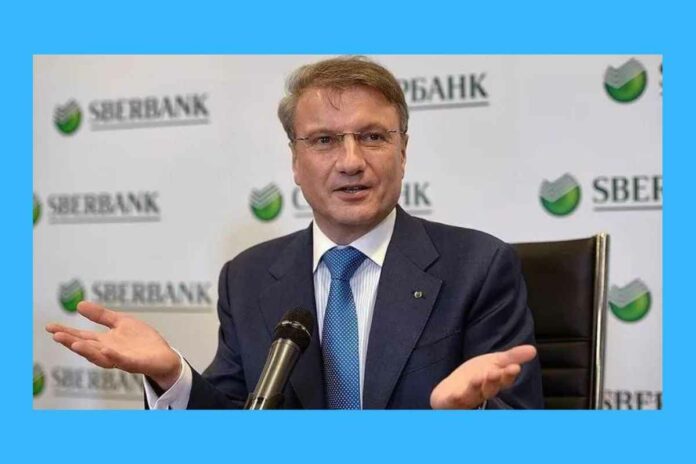Herman Gref is the Chairman of the Management Board of Sberbank, who had been a major political figure in the early 2000s.
His name is usually the first to come to mind when talking about the team of young economic reformers at the time. Herman Gref’s biography is a perfect example of a life path that was common among the generation of top managers who started their careers at the dawn of perestroika.
Table of Contents
Herman Gref’s early years
He was born on February 8, 1964, in the village of Panfilovo, Pavlodar region (now Kazakhstan). The Gref family are ethnic Germans who were forced to move to a remote region of the USSR during the first years of World War II.
Gref does not remember his father who died when his son was less than two years old. His mother and grandmother were the ones who had to take care of the children.
Herman Gref graduated from school in the village of Irtyshsk, where his family moved from Panfilovo. His first attempt to enter the university wasn’t successful, so Gref joined the army in 1982.
After completing his military service, Gref was sent to a pre-academic program at Omsk State University; having graduated from the course, he successfully entered the university to study law.
After getting his degree in 1990, Gref decided to devote himself to academic work and stayed at Omsk State University. Thanks to the assistance of his teachers, he later was able to get into a post-graduate program at Leningrad State University.
Gref relocated and began working on his thesis under the guidance of Anatoly Sobchak, Head of the Department of Commercial Law. However, he finished his work much later; Herman Gref received his PhD in Economics only in 2011. He defended his thesis at RANEPA.
Work for government
Until 1993, Herman Gref successfully balanced his work and post-graduate studies. He got a position as a legal adviser at Petrodvorets District Administration, and a year later he accepted a job at the City Administration as the head of the district property management committee.
After that, his career as a manager was developing rapidly:
- from 1992 to 1994, he was Deputy Head of Petrodvorets District Administration and Head of the City Property Management Committee;
- from 1994 to 1997, he was Deputy Chairman of the City Property Management Committee of St. Petersburg City Administration;
- from 1997 to 1998, he was Vice-Governor and Chairman of the City Property Management Committee.
While working in property management committees, Herman Gref initiated many reforms. His position as a key manager allowed him to launch the fight against the monopoly in the housing and utility sector; it also made it possible for him to effectively advocate for price regulation and fair distribution of government contracts.
After a while, Gref got the opportunity to promote his progressive ideas at the state level. In 1998, he moved to Moscow to assume the position of Deputy Minister of State Property of the Russian Federation.
At the same time, Herman Gref was engaged in the affairs of the FCSM and was working on the program of economic development of Russia for the next ten years.
In 2000, in order to execute the plans for economic reforms, the President signed a decree establishing the Ministry of Economic Development and Trade, led by Herman Gref.
News anchors referred to the newly formed government as the youngest government in the country’s history. The Minister of Economic Development and Trade was only 36 at the time.
Gref’s main achievements as Minister included developing the Tax Code, establishing the Stabilization Fund, servicing Russia’s foreign debt, and making preparations for the Winter Olympics in Sochi.
After seven years of successful reforms, the Minister handed in his resignation. In the interviews, Gref explained that the main reason for his leaving the government was exhaustion since he had to devote all his time to work.
Herman Gref: Sberbank and reforms
The top manager took over the leadership of Sberbank at the end of 2007. The liberal reformer had to take a firm stance, as the board of directors considered the bank’s situation to be stable and saw no need to make any changes.
Herman Gref saw expanding the product range, developing sales, and improving customer service as his main tasks.
Led by the new CEO, the bank transformed its technological platform and transferred most of its transactions to a remote format. One of the key achievements of the top manager was the reorganization of the credit-issuing system.
Making it simpler and being loyal to the clients allowed Sberbank to increase its credit portfolio and attract small businesses.
Now Herman Gref is working on transforming the bank into a major fintech company. In 2022, the company reshaped its non-banking services as a separate e-commerce group, and the rest of the ecosystem was divided into two sectors — for legal entities and individual clients.
Today, Sber’s structure consists of more than 40 companies, including food delivery, logistics, taxi, and car-sharing services.
Personal life
The top manager met his first wife, Elena, in high school. After graduation, the couple got married and had a son, Oleg. The young marriage broke up, but the former spouses maintained a friendly relationship.
Gref’s second wife, Yana Golovina, tried her hand at interior design, and then created a family business project and founded a private school called Horoshkola.
This educational institution pays great attention to the individual needs of every student and helps them develop their talents in the most efficient way. Gref’s children and grandchildren study at this school.
The CEO of Sberbank pays a lot of attention to sports and meditation; he loves Goethe and Bulgakov and reads self-development books. Gref’s personal life is rarely discussed in the tabloids — he devotes all his free time to his wife and children.
The family spends their holidays together and has a tradition to gather for a weekly Sunday dinner.














